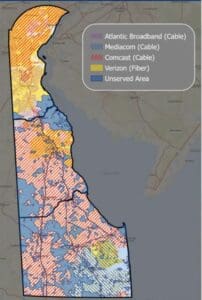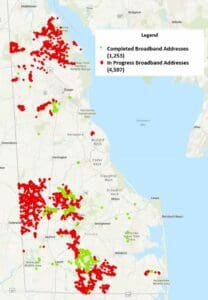
More computers will be coming to life as the state tackles the ‘last mile’ in broadband deserts.
NOTE: This story corrects a statement to say that it costs $100,000 per mile to lay broadband cable and install equipment. A previous version incorrectly said it cost that much per house.
Delaware state computers had to contend with 567 billion — “billion with a B” — cyberattacks in the last quarter of 2022, the director of the Department of Technology and Information said Tuesday.

Jason Clarke
Most are caught and blocked by security software, but the staff had to investigate 4,000, said Jason Clarke, Delaware’s chief information officer.
Some of the attacks briefly shut down school computers and other programs, he said.
“It is a constant battle of blocking and tackling,” he said.
Clarke was testifying before the General Assembly’s Joint Finance Committee. It has been holding hearings all month before deciding the state’s budget.
It has to be passed by June 3o in order for the state’s fiscal year 2024 to start July 1.
Among other things Clarke said:
- The department expects a budget of $158 million to fund the installation of broadband technology in the state’s internet deserts.
- DTI continues to lose employees to private companies and those employees are being paid an average of $50,000 more a year. “We are competing not just with Delaware and the banks like we have traditionally done here in Delaware, but we are competing with the whole nation,” he said.
- Schools returning to in-person classes meant that students brought back devices that had not been in school before, stretching the state’s service and forcing it to add capacity. “Schools 10 years ago were 10% of the traffic across the state’s network. Today, they are 90%,” Clarke said. “It’s literally the tail wagging the dog when it comes to managing the network.”
- Inflation is hitting the department hard as it renegotiates contracts for various services, with one contract rising $267%.
The department is asking for a slight increase to the $59,087,100 recommended in Gov. John Carney’s proposed budget. Clarke asked for $60,040,800, mostly for more employees.
He said the department request was small because it’s still managing $125 million in multiyear projects funded by federal COVID and American Rescue Plan money.
Sen. Trey Paradee, D-Dover, said he personally knew someone who had more than doubled their salary when they left the department.
Clarke said he left three positions that doubled or more than doubled their salaries out of his calculations because they skewed the numbers badly. He pointed out that he does all the exit interviews and asks to see actual job offers to confirm the salaries.
Broadband deserts
Several lawmakers questioned Clarke about the state’s program to expand broadband access.
He said the state is using a variety of resources to fund the multiyear project: $33 million in federal American Rescue Plan Act money; at least $100 million in Federal Communication Commission grants expected this summer; $12 million in federal digital equity grants; and another $13 million in FCC development opportunity grants.
Clarke said the state applied for additional grant money from the FCC but has not yet heard if it will get it.
Contractors started laying cable and installing equipment in November, Clarke said, with a goal of connecting 5,850 houses within a year. So far, they’ve laid more than 100 miles of cable.
That includes 1,414 Kent County addresses; 473 New Castle County ones; and 3,963 Sussex County addresses.
It’s that last mile that’s the most expensive, he said.
A department analysis of the location of the homes showed that most were within one and one-half miles of connectivity.
“Which means we have a last mile issue to solve in our state,” he said.
It costs about $100,000 per mile of cable, and one reason so many service providers were unwilling to pay that is because it’s impossible to recoup their expenses by charging $80 a month for service, Clarke said.
So far about 1,253 homes have been connected.
Companies providing the service tell the state that so far about 25% of the total connected have signed up for service.
That’s not unusual, Clarke said, and it’s expected to rise to 40%.

Betsy Price is a Wilmington freelance writer who has 40 years of experience, including 15 at The News Journal in Delaware.
Share this Post






